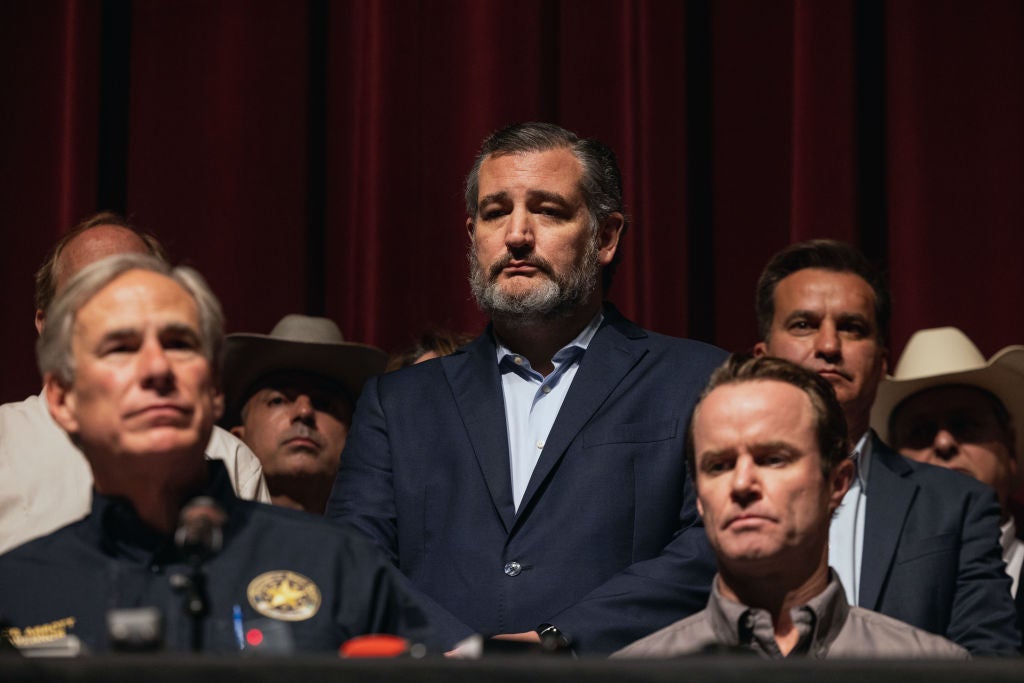What should the federal government do about gun violence? The collective position of Republicans in Congress during the modern era of mass-fatality shootings has been that the answer to that question is basically nothing. Whether because of sincere belief or fear of being defeated in a primary by another candidate who is “stronger on the Second Amendment,” Republican politicians almost unanimously do not support legislative responses to the gun epidemic.
But when more than a dozen children are killed in an elementary school (again), the moment seems to call for someone to say something. The media takes an adversarial stance, especially towards Republicans. Members of that party have to answer questions and fill space with words that demonstrate concern and at least a vague suggestion that they would like to prevent another such event.
In the wake of the shootings in Uvalde, Texas, the most prominent Republican to take on this job has been Sen. Ted Cruz.
In multiple interviews from Uvalde, Cruz has, with a tone of deep conviction and concern, called for schools to reduce the number of doors they use. “Don’t have all of these unlocked back doors,” he said on Fox News. “Have one door into and out of the school and have that one door—armed police officers at that door.” Texas Lt. Gov. Dan Patrick and House Minority Leader Kevin McCarthy are among the others who’ve said the same thing: You stop shooters by making them get past someone else with a gun.
As was covered in Slate on Wednesday, the general idea of preventing shootings by enhancing security—it’s referred to elsewhere as “hardening” schools—is not a new one. As NBC News has reported, Uvalde’s school district had already adopted a number of measures meant to make attacks more difficult.
As multiple studies cited in Wednesday’s Slate piece have found, moreover, there is no evidence that the presence of an armed guard reduces the number of fatalities a school will suffer during an attack. While official descriptions of what happened in Uvalde have been hazy and contradictory, they suggest that police officers did find the shooter before he entered a classroom, but failed to stop him. Even in the Cruz scenario, a shooter could pull a fire alarm or stage an attack during the time that hundreds (and in some cases thousands) of students were being funneled through a single point.
The practical problems that Cruz’s plan would present also suggest that he is not intimately familiar with what actually happens at schools. Students, even young ones who have a single primary teacher, spend the day moving between rooms inside their buildings, going from building to building on larger campuses, and using grounds outside for recess and other activities. Arranging for students to stay entirely behind a locked door during the school day, and to never use an entrance or exit that isn’t guarded, would require an overhaul of the educational experience, not to mention renovation and construction at, one imagines, almost all of the nation’s 130,000 schools. (For one, you’d have to install air conditioning at the many schools that don’t have it, because having open windows in hot weather would provide an access point.)
Cruz may have done a service to the discourse, though, with this tough-guy tactical talk—which is really a giant infrastructure plan that he probably would not vote to pay for.
It fails what you might call the water-cooler common sense test: Whether a given political idea registers as reasonable to a casual news consumer who is not strongly partisan. If your idea to prevent massacres at schools requires that they maintain the same level of security as a prison or a military installation—and is so random it’s not even mentioned in the many polls measuring public opinion on the subject—that might communicate better than anything you could actually say that a different approach is required.
